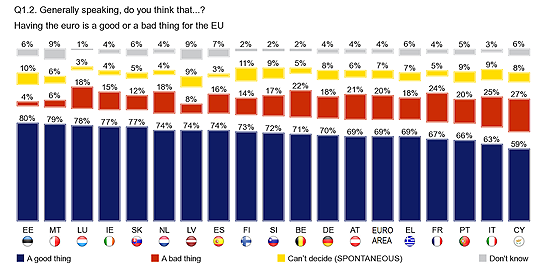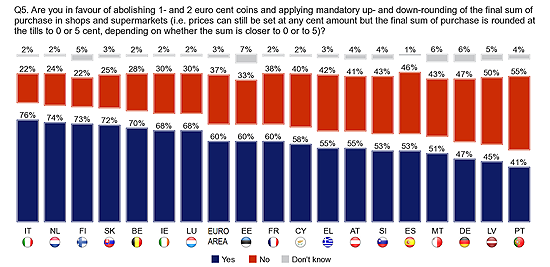

Accessibility tools
Service tools
Language
Navigation path
24.10.2014 - The latest euro area Eurobarometer survey shows that support for the euro remains high and stable in euro area Member States and that the vast majority of citizens support the idea of economic reforms.
Stable overall majority sees the euro as good for their own country and for the EU
57% of respondents said that they thought the euro was good for their own country, the second highest percentage since the introduction of the survey in 2002 and unchanged since last year.
Citizens in Ireland, which completed an EU-IMF economic adjustment programme in December 2013 are the most positive about the euro. 76% of respondents said that the common currency was good for Ireland. Appreciation is similarly high in Luxembourg and Estonia, where 73%, said the same. Support for the euro has increased strongly in Estonia (15pp.), the euro area’s second most recent Member.
In Latvia, which joined the euro in January this year, the survey showed that 55% of citizens thought the euro was good for their country. Support for the euro, however, appears lower in Cyprus and Italy, at 42% and 43% respectively.
A strong majority of 69% of respondents across the euro area also sees the euro as good for the EU. While a majority of respondents in every country agrees, there are nevertheless important differences between the 18 countries.

More than three quarters of euro area citizens support significant economic reforms
Asked about their views on economic reforms, as many as 79% of respondents said that they saw the need for significant reforms to improve the performance of the economy. Similarly, 75% agreed that governments needed to save more now so as to prepare public finances for population ageing. 70% of respondents also agreed that economic reforms would be more effective if they were implemented in a coordinated way at EU level and more than two thirds said they favoured greater coordination of economic policies (69%).
However, more respondents disagreed than agreed with the idea that successful reforms in other euro area countries have facilitated reforms in their own countries (48% vs. 41%), a majority of respondents (70%) disagreed with the idea that governments should raise the retirement age to ensure the sustainability of the pension system.
Citizens dislike small-denomination coins
Citizens were asked specifically for the first time whether they would favour the abolishment of one and two cent coins and a mandatory rounding (up or down) of the final sum of purchase to the nearest five cents. 60% of respondents said they would favour such a move, while 37% were against it.
In all but three countries, a majority of respondents supported the idea while a majority of respondents in Portugal and half in Latvia were against this. Opinion in Germany was equally divided.

Background
Citizens replied to a set of questions focusing on issues ranging from perception and practical aspects of the euro to their assessment of the economic situation, policy and reforms in their country and in the euro area. In addition, citizens were asked about their views and expectations regarding household income and inflation.
Some 16 500 respondents across the 18 euro area countries were interviewed by phone on 6 – 8 October 2014.
Documents
Additional tools